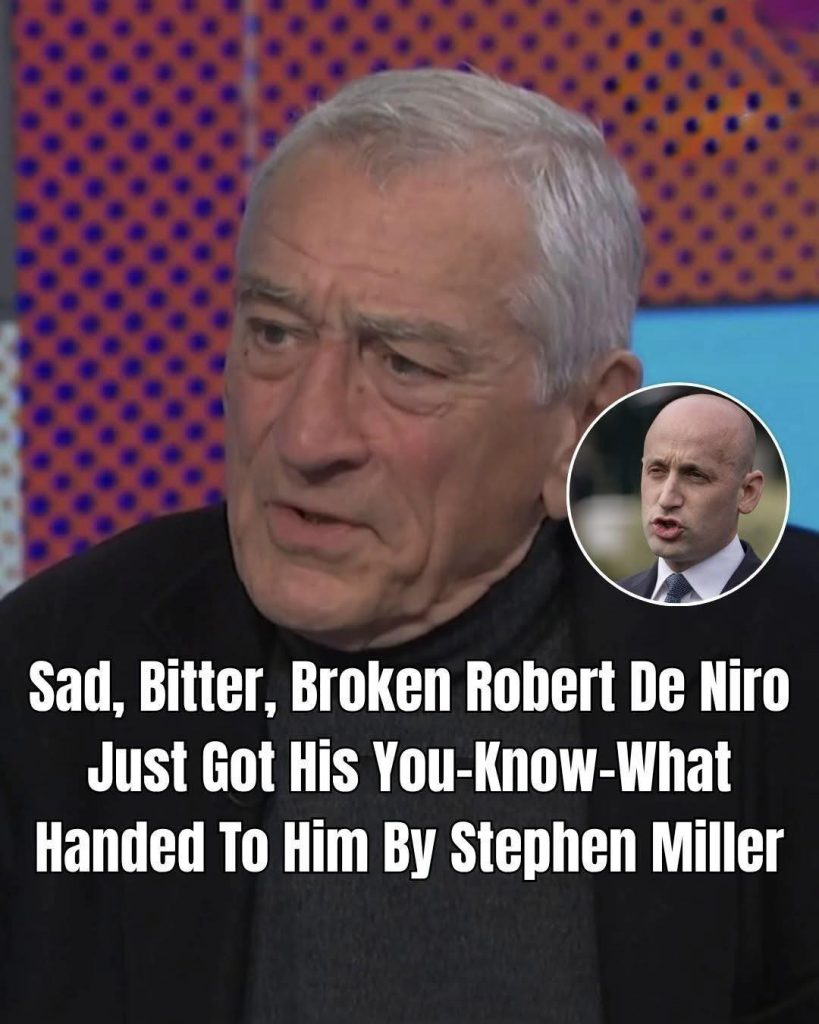A heated exchange between actor Robert De Niro and White House Deputy Chief of Staff Stephen Miller has stirred fresh controversy this week, after De Niro used an MSNBC interview to deliver sharp criticism of Miller and the Trump administration. Miller responded with equally strong words, dismissing De Niro’s comments as “bitter and desperate.”
De Niro’s Accusations During Weekend Interview
The controversy began when the Oscar-winning actor appeared Sunday on MSNBC’s The Weekend, where he was asked about his views on President Donald Trump and members of his administration.
De Niro, a longtime critic of Trump, repeated his familiar concerns that the former president could attempt to extend his time in office beyond the constitutional limit of two terms.
“He will not want to leave,” De Niro said during the broadcast. “He’s setting things up in a way that’s dangerous for democracy.”
He then turned his attention to Stephen Miller, referring to him as the “Goebbels of the Cabinet,” a reference to Joseph Goebbels, the chief propagandist for Adolf Hitler’s regime.
“He’s a Nazi,” De Niro said, adding, “And he’s Jewish, so he should be ashamed of himself.”
The comment drew immediate backlash online, as many critics said De Niro’s statement crossed a line by invoking Holocaust-related comparisons and making remarks about Miller’s faith.
Stephen Miller Responds on National Television
Miller, who rarely engages with celebrities, addressed De Niro’s comments during an appearance on Fox News’ Hannity on Wednesday evening.
Speaking directly to host Sean Hannity, Miller denounced De Niro’s remarks as “ugly and baseless,” accusing the actor of resorting to personal attacks because he has nothing meaningful to contribute to political debate.
“He has not made a movie worth watching in at least 30 years,” Miller said. “Probably the longest string of flops and embarrassments of any major actor. This man has been degrading himself on camera with one horrific film after another, and he’s not taken seriously by anybody — not his family, not his friends, not his community.”
Miller went further, saying that De Niro had become a “sad, bitter, broken old man” who uses television appearances to “stay relevant.”
“He’s a shell of who he used to be,” Miller said. “And when someone has fallen that far, they lash out at others to fill the void. That’s what this is about.”
Public Reaction: Sharp Divide Online
As expected, the exchange triggered a wave of responses across social media. Supporters of the Trump administration praised Miller for defending himself against what they viewed as an inappropriate and offensive personal attack.
“Calling anyone a Nazi is disgusting, but saying that to a Jewish American is beyond the pale,” one X (formerly Twitter) user wrote.
Others defended De Niro, arguing that he has long been outspoken about what he perceives as threats to democratic norms. “Robert De Niro has always spoken his mind,” one user said. “He’s earned the right to criticize those in power.”
Still, many observers agreed that the rhetoric on both sides reflected the growing bitterness of American political discourse.
“Both of them are playing into the same cycle of outrage,” said Dr. Amelia Burns, a media analyst at Georgetown University. “De Niro’s language was extreme, but Miller’s response also sought to humiliate rather than elevate the conversation. It’s an example of how personal feuds now dominate the political arena.”
A History of Clashing with Trump
De Niro’s feud with Trump and his allies is far from new. Over the past decade, the actor has repeatedly criticized Trump in interviews, speeches, and even award show appearances.
In 2018, at the Tony Awards, De Niro received a standing ovation after declaring, “I’m going to say one thing: F*** Trump.” Since then, he has maintained a steady drumbeat of criticism, frequently calling the former president “dangerous,” “unfit,” and “a wannabe dictator.”
De Niro also campaigned for Democratic candidates during multiple election cycles and has appeared on several talk shows to discuss his concerns about Trump’s leadership style and influence.
Trump, for his part, has rarely missed an opportunity to respond. He has described De Niro as “a very low IQ individual,” “deranged,” and “a washed-up actor.”
The two men’s exchanges have become symbolic of the broader cultural divide between Hollywood and conservative politics.
Stephen Miller’s Reputation in the Administration
Stephen Miller, one of the most prominent figures in Trump’s inner circle, has been both admired and criticized for his firm stance on immigration, national security, and cultural policy.
A key architect of Trump’s border policies, Miller has often been portrayed by critics as the driving force behind the administration’s hardline immigration agenda, including the “zero tolerance” policy that led to family separations at the U.S.-Mexico border.
Supporters, however, describe him as a disciplined strategist with a deep understanding of constitutional law and American history.
“He’s been demonized because he’s effective,” said Mark Meadows, former White House Chief of Staff. “But those who’ve worked with him know he’s deeply patriotic and dedicated to restoring fairness to American policy.”
Celebrities and Politics: A Familiar Flashpoint
The clash between De Niro and Miller highlights an increasingly common trend: celebrities using their platforms to engage in political debate — and government officials responding in kind.
“Hollywood has always had a political voice,” noted Dr. Rebecca Hall, a sociologist specializing in media and culture. “What’s changed is how that voice is amplified through social media. Statements that once might have stayed within entertainment circles now become part of national political discourse within minutes.”
That amplification often fuels division rather than dialogue. “These moments don’t create understanding,” Hall added. “They generate headlines, outrage, and clicks — and both sides know that.”
Community Response and Ongoing Fallout
Following the exchange, several Jewish organizations condemned De Niro’s reference to Miller’s faith, calling it “deeply inappropriate.”
In a statement, the American Jewish Committee said:
“Using Nazi analogies to criticize political opponents diminishes the memory of the Holocaust and contributes to a toxic public conversation. Political disagreements should never be framed in religious or ethnic terms.”
De Niro has not issued an apology or clarification as of Thursday, though representatives close to the actor suggested he “stands by his remarks” and sees them as part of a broader warning about authoritarian tendencies in politics.
Miller, meanwhile, said he would “not be distracted” by Hollywood critics, telling Hannity, “The American people care about results, not celebrity tantrums.”
A Symbol of the Current Divide
The feud between De Niro and Miller may soon fade from headlines, but it reflects a deeper pattern in American politics — one where entertainers and political figures increasingly act as cultural combatants in a polarized media landscape.
As one political columnist noted, “This isn’t really about De Niro or Miller. It’s about how divided the country has become. Every insult becomes national news, every feud a symbol of something larger.”
Whether De Niro’s comments were an expression of personal frustration or a deliberate political statement, and whether Miller’s response was measured or combative, the controversy once again illustrates how easily the line between entertainment and politics can blur in the modern era.
For now, both men remain steadfast in their positions — and the public debate shows no sign of cooling down.


